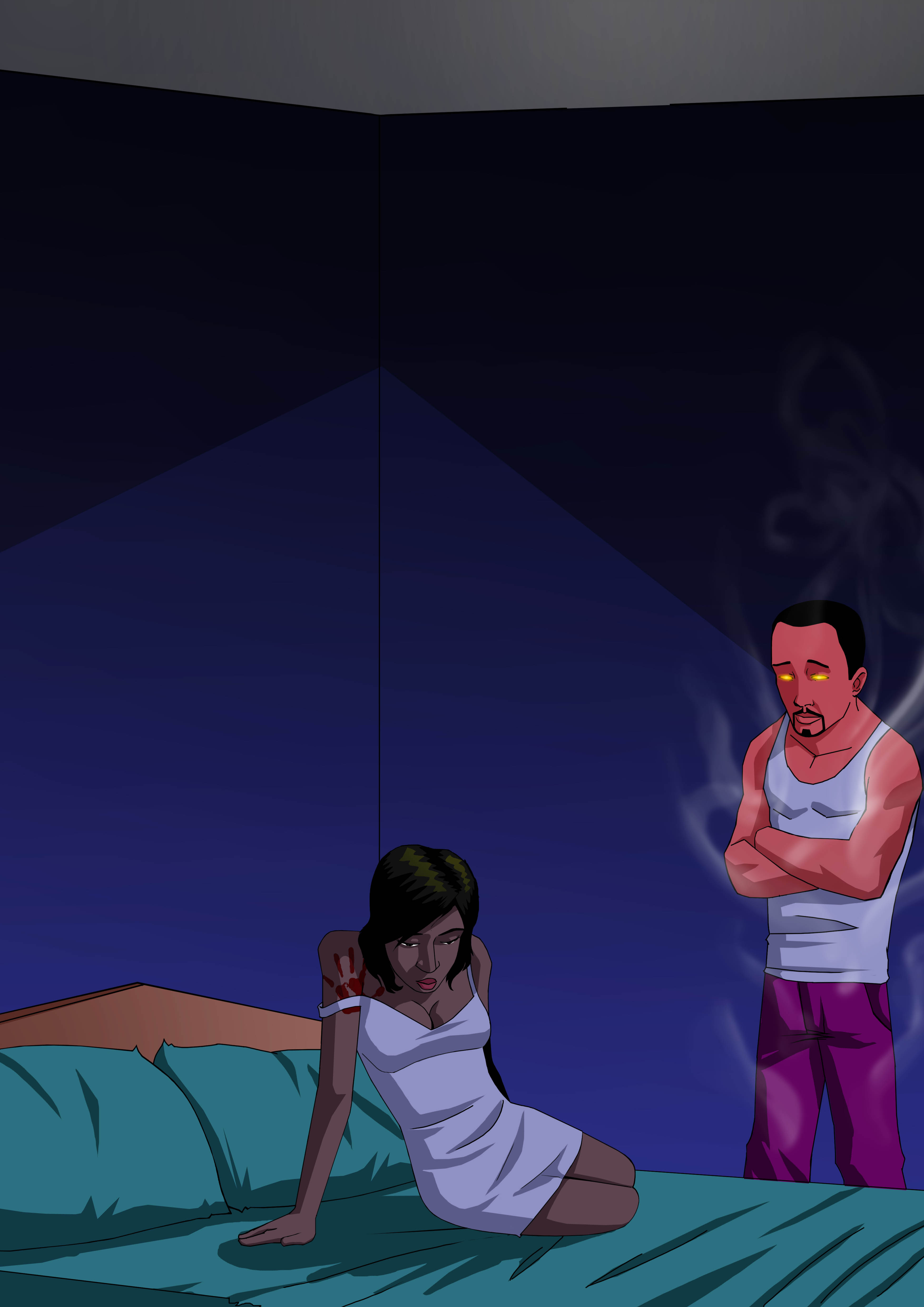By Dr. R. Abdulrehman
He brought a glass of cold tap water to his burning lips, and felt the temperature of the liquid heat as it slid down his insides. Nothing stayed cool with him. Resting the empty glass with a shaking hand on the slivered wooden kitchen counter, he retired to his recently ruffled sheets to rest the redness of his eyes. It had only been a few hours since she had run out, screaming. When he pulled the cool sheets over his shoulders, his naked skin tightened and tensed, just like when she’d run her fingers across his chest.
Like the water, the sheets caught the warmth of his skin, and the pleasure of the cool of the midnight hours disappeared as quickly as she had. He tried to rest, but could not. The sheets got hotter and even more uncomfortable. African summer nights did nothing to cool the temperature of minds obsessed with worry and regret. He had never let his skin touch hers, until this night.
“After marriage,” he used say to her, delaying the inevitable, “after marriage.” But it was hope and not religious ruling that made him delay. Hope that somehow, the more he delayed, the more the chance he would change, or that she would somehow become more resilient. And hope that by then, eventually, after marriage, he wouldn’t scare her away when they finally pressed, skin to skin. Hope for things that he knew couldn’t change.
Theirs was a private and short wedding earlier that night. He had sought out a fatwa from an off-kilter imam of his mother’s people, who had allowed the secrecy of their union. The night was officiated only by themselves, the presence of God, and a photograph of his young father that hung high on a wall in his room. Her lips had almost melted when he’d pressed himself to her, aflame with desire. He remembered her eyes widening in fear before she pushed herself away, realizing his true nature.
#
His mother had always told him that humans were weak and cowardly creatures. Like his father who had tried to leave his mother when she became pregnant with him. If the human community in Zanzibar had known of his affair with a female jinn, they would have cast him away to the Prisoner’s Island. But they never found out. When she realized he had decided to leave her, his mother had simply possessed him and made his neck swell and eventually burst. No guilt, no remorse; jinn were temperamental that way. His mother had then borne him on his father’s grave; he had singed her on his way out. More jinn than human; more fire than earth.
His mother had taught him to assume human form. And a pleasing human form at that. Dark hair that disappeared into the Zanzibar night, eyes with the gleam of black pearls like those from the wild oysters found in the Indian Ocean, and the milk-and-honey skin that his Persian father had contributed. Still, he was an abomination. And that was the reason his lover had left.
#
On Fridays he would wait for her at the steps of the mosque where she would teach children to read the Quran. He’d arrive a whole hour early to hear the children’s voices reverberate off the walls of the mosque. Tiny voices reciting large melodic verses with meanings greater than they could comprehend. But they understood them more readily than he could understand why she cared for him so much.
Their voices moved him almost as much as she did. They would start with the iconic prayer: “A’udhu Billahi Minash Shaytaan Arrajeem.” I seek refuge in God from the accursed Shaytan. Each time he heard it, he hoped and prayed that when she eventually kissed him, that she would see he was still a person and not a devil to be feared.
Once, after she had taught madrasa, she had asked him if he had prayed already. He lied that he had caught congregation prayer in a different mosque an hour ago. He had spent the last hour thinking of how to avoid touching her. And the hour before that, thinking of what to say if she asked him if he had prayed. As he spoke to her at the foot of the mosque, he could see several jinn of pure fire preparing for prayer behind her. She turned to see what he was looking at. He told her that he was staring at the fez of a man in the mosque. Said that he always wanted one like that.
When they met the next evening, she brought with her a boxed parcel wrapped in plain brown paper, and tied with rough white string. She told him she had had her cousin mail it to her from Dubai. Pulling the string and gently removing the tape from the edges, the striations in his hands twitched. Inside the box was a fez of royal red velvet. Its tassel was made of the hair of an Arabian stallion. And when he put it on, it looked as if he had pulled a lock of his hair through the top of the hat. She laughed and went to adjust the angle of the fez. In fear of her touching him, he jerked his head backwards, and the hat fell into the mud of the alley street.
Two weeks after that day, over the smoke of a houka pipe, he told her his secret.
“Do you promise not to be scared? W’Allah?” he asked.
“W’Allahi, I promise!” she answered, shoulders leaning forward. Her ears perked as her eyes widened ever so lightly, the corners of her mouth following their movement to a coy smile. Her back, arched with interest, made her resemble a Stone Town alley cat. The kind of cats the witches used to communicate with the jinn. This was a perfect moment, he thought. And then he told her. He told her his nature. That his passion for her may burn her delicate and dark fingers. The words left his mouth like opium smoke from a witch’s mouth.
She said she had known ever since she saw his devilish smile; that his walk was more of a glide. She said that anyone who could spit on the Sultan’s palace and tell the guards they smelt like a monkey’s wind had to have fire in his belly.
But it was clear she did not believe all of what he said. Excited, like a cat, she had moved impatiently to touch his face. But like most Zanzibaris, he was startled by cats, and he withdrew. To ease her sullen and disappointed expression, he did what most lovers do. He reminded her of his affection. He also did what most pious people do. He reminded her that they could touch, after marriage.
At the time she had thought him a poetic and shy soul who was simply modest. That his tales of the temperature of his flesh were just words to describe how much she invoked in him. She mistook him for being good with words. He mistook her for having an understanding nature.
#
He sat on the edge of his hot bed now, playing with the fez and trying to pry pieces of dried mud from its skin. No use in trying to clean it now. The moon had made its way past his window and the muezzins were calling the city for morning prayer. The scent of Kilimanjaro coffee was wafting through his window, catching in the cotton of his tattered drapes. He wanted to catch her, dark skin in white cotton, like the scent of that coffee. He wanted to be all earth, or more fire. He needed her lips to touch his fingers when he fed her her favorite dish of hot bread and cold butter. He wanted her smooth ebony fingers to run across the canvas of his cheekbones.
He had hoped she would rest in the earth of his being, her head on his chest, with patience. That his passion would eventually subside, and his fire would cool to the temperature of morning earth, ready for a garden.
But the garden that grew for him instead was a burning shrub. As the call for prayer ended, and a hollow silence filled the sky, he recited the ancient words, “A’udhu Billahi Minash Shaytaan Arrajeem.” For now he knew that she had finally realized his nature and hers.



[…] More Fire Than Earth[7] by Dr. R. Abdulrehman | Omenana […]